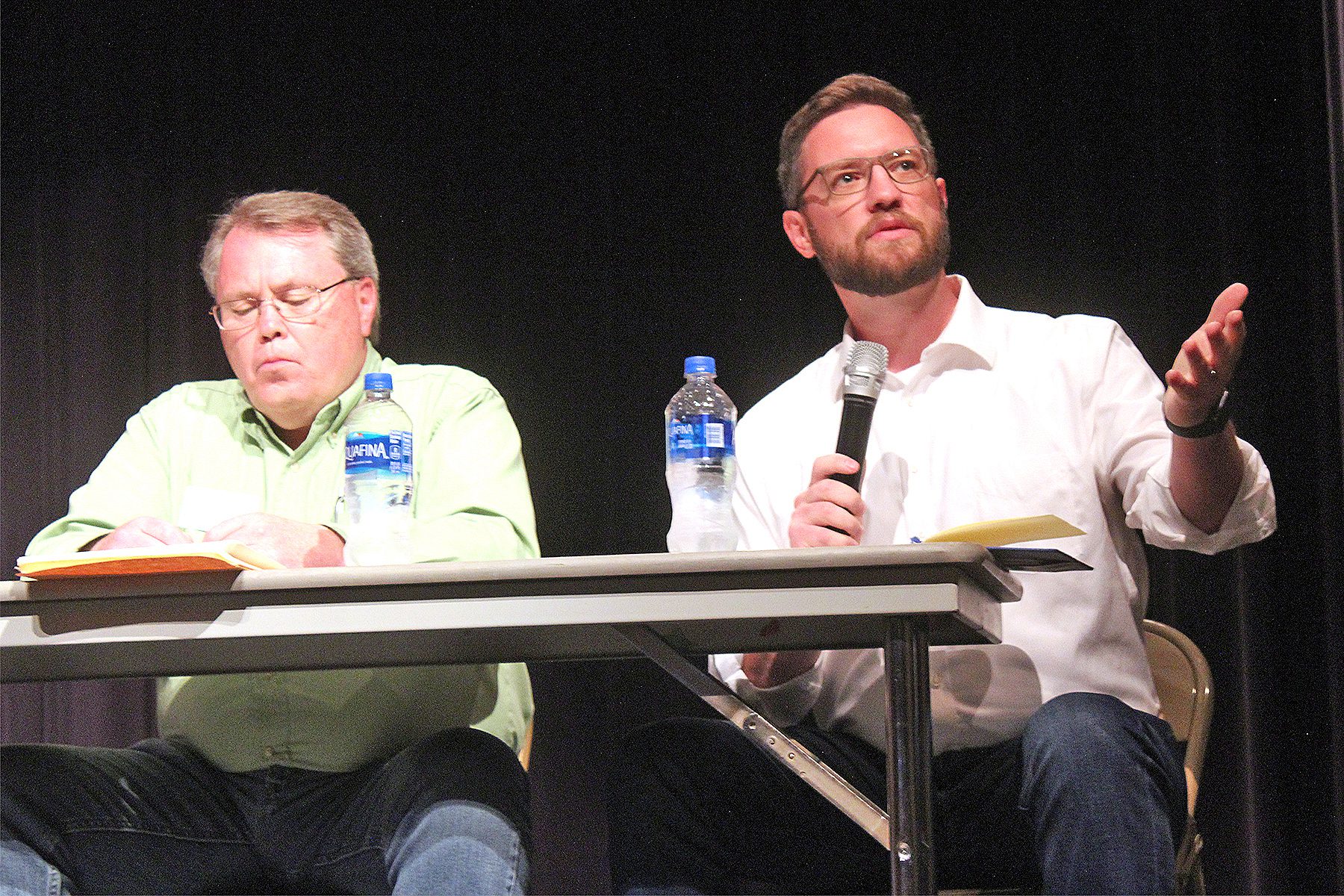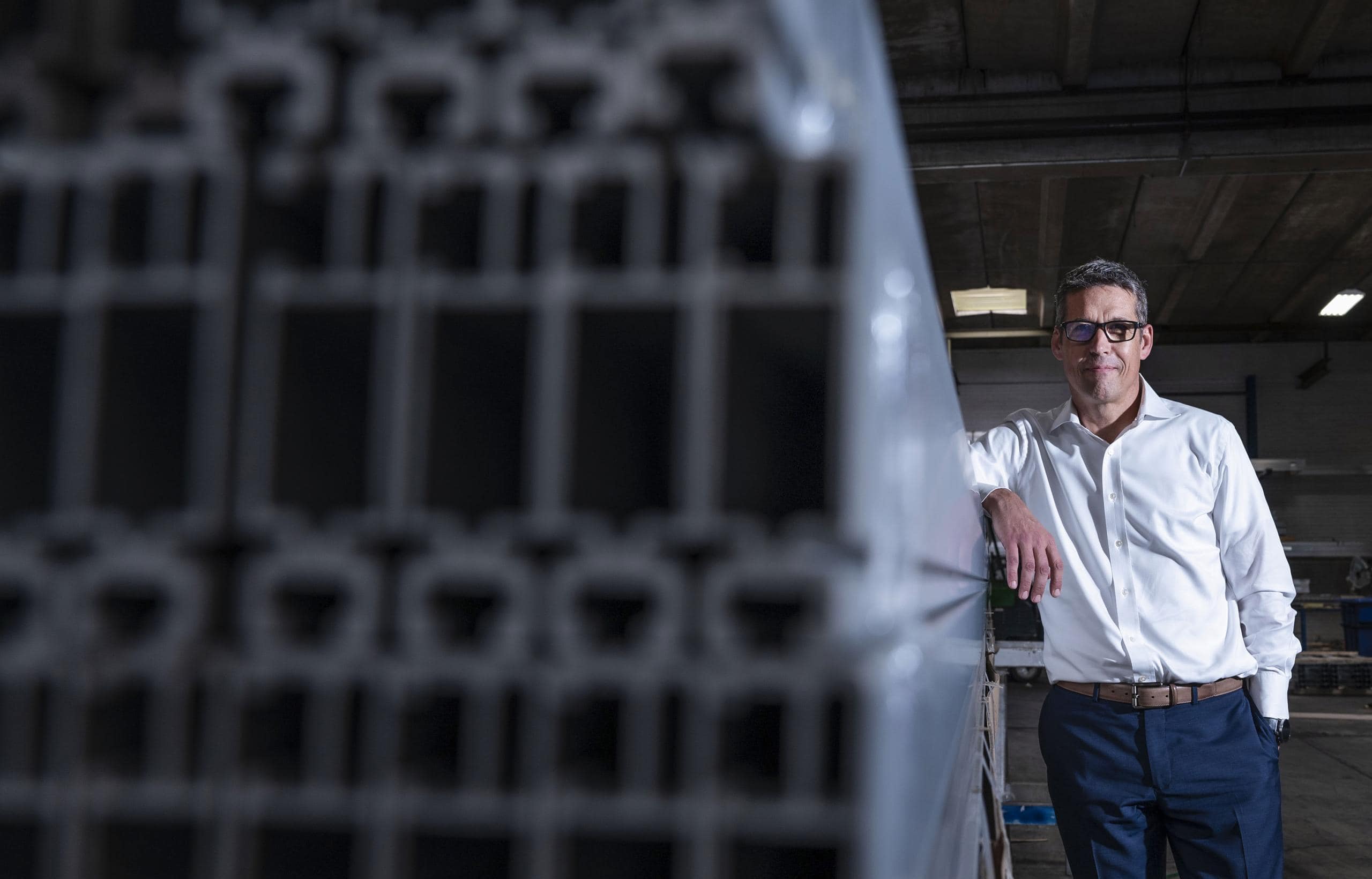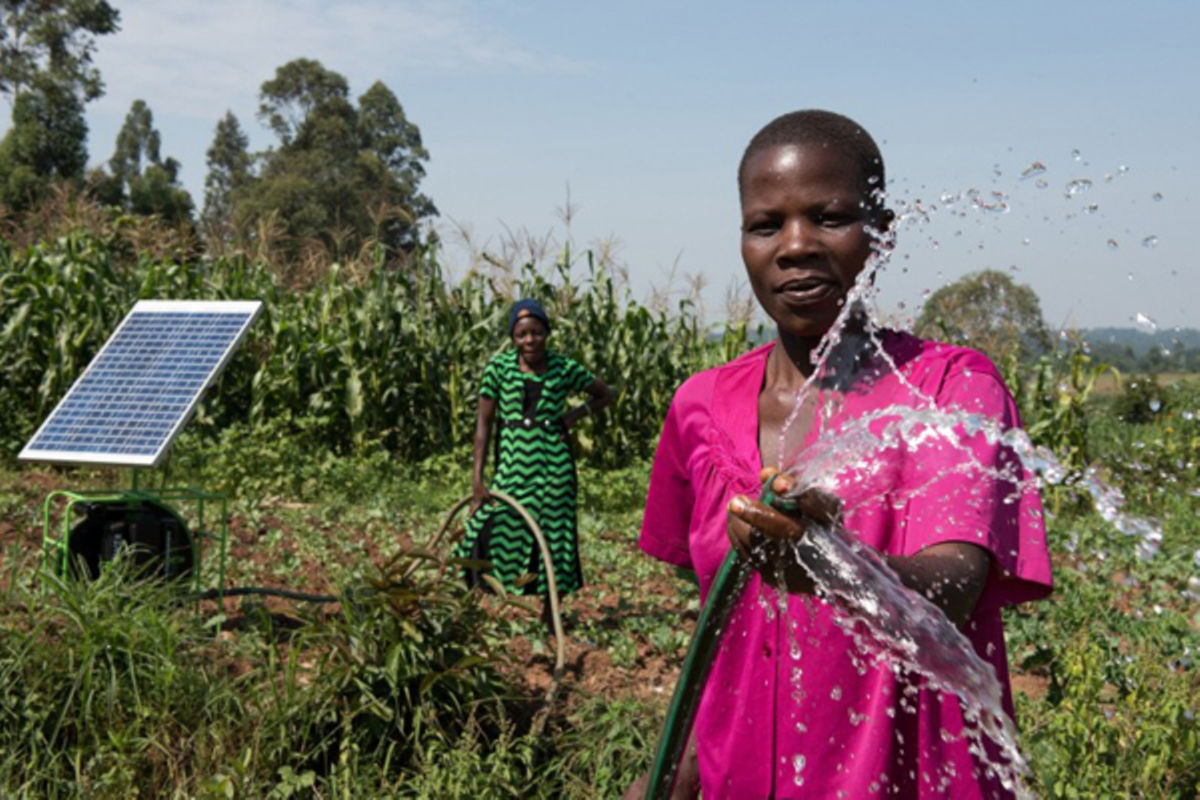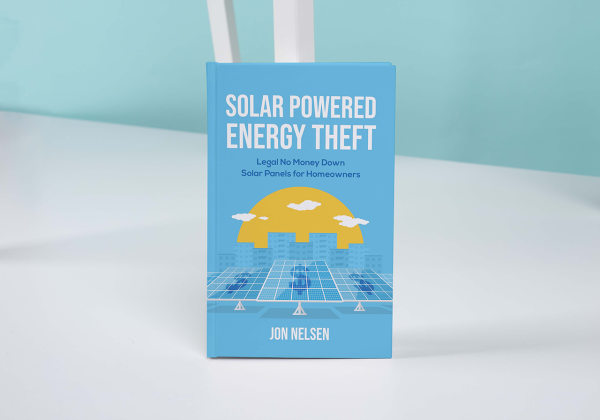Neil Bishop, a senior area manager for ITC Michigan, explains the ITC’s role with Michigan’s electric grid during a solar energy town hall meeting last Thursday at Saranac High School as Michigan State University Extension bioenergy educator Charles Gould listens at left. — DN Photo | Elisabeth Waldon
SARANAC — As a solar energy developer works on bringing a project into Ionia County’s Keene Township, about 100 people attended a town hall meeting on the topic last Thursday evening.
Keene Township Supervisor Robert Simpson hosted the gathering inside Saranac High School’s auditorium, alongside Charles Gould, a bioenergy educator for Michigan State University Extension, and Neil Bishop, a senior area manager for ITC Michigan.
Glaringly absent from the meeting was a representative for Invenergy, the American-based multinational wind and solar generation development and operations company. While the meeting was advertised that an Invenergy rep would be present, Simpson announced at the start of the gathering that the rep had become unavailable at the last minute.
“Property rights go as far as the zoning and last I knew Keene Township was zoned mostly as ag land and your master plan protects ag land,” said Christine Barns of Mulliken, a Republican candidate for 78th District state representative, during a solar energy town hall meeting last Thursday at Saranac High School. — DN Photo | Elisabeth Waldon
Simpson proceeded to take public comment on the topic of solar energy and answer questions to the best of his ability, with assistance from Gould and Bishop.
Invenergy is actively working on bringing a solar farm to about 500 acres in Keene Township, but the project remains in the early stages and no special use permits have been applied for yet.
The Keene Township Board originally approved a solar energy ordinance in 2018 when residents began installing their own residential solar panels. The township board voted to amend the ordinance this past March to better regulate home property use and farm and business use. The Planning Commission is still working on the commercial solar portion of its ordinance and will next meet on Aug. 12 to continue working on this. The township board is next scheduled for a regular meeting on July 12.
Christine Hendrick of Keene Township has been working to recall Simpson and other township board members. Her first recall effort failed at a clarity hearing held by the Ionia County Election Commission. Hendrick has since filed new recall language and a second clarity hearing is scheduled for 10 a.m. on July 1 on the second-floor multipurpose room of the Ionia County Courthouse.
RENEWABLE ENERGY PUSH
Gould provided a detailed explanation of the history and players behind what’s driving the ongoing renewable energy push, both in Michigan as well as nationwide (see accompanying info box). Gould has long worked with farmers on behalf of MSU Extension and he currently studies how farmers grow crops around solar arrays.
Earlier on Thursday, Gould went on a tour with multiple township officials from throughout the state hosted by the Michigan Association of Planners — first to an Apex Clean Energy-developed wind turbine farm in Isabella County, then to a Ranger Power-developed solar array farm in Shiawassee County. Both Apex and Ranger are working to bring similar projects to Montcalm County.
Michigan State University Extension bioenergy educator Charles Gould provides a detailed explanation of the forces driving the push for increased renewable energy use in Michigan and nationwide during a town hall meeting last Thursday at Saranac High School. — DN Photo | Elisabeth Waldon
Gould responded to several questions voiced by audience members:
• What are solar panels made of and do they contain hazardous chemicals? Gould said solar panels are made out of silicon (sand) and then encased in glass.
“There’s a tiny fraction — just a tiny fraction — of metals that are necessary for converting solar energy into electricity,” he said. “They are encased in that glass. They are not going to leach out. That’s one of the things that gets circulated around that is not true. They are not capable of leaching out.”
• Do solar panels cause glare?
“The purpose of a solar panel is to absorb as much glare as possible,” Gould said. “To have glare means there is solar energy that a solar module is not able to capture. Solar module manufacturers have gone to great lengths to make sure there’s no glare. Glare is really a non-issue.”
• How loud are solar farm inverters?
Simpson read from a study by Hankard Environmental which stated that most solar farm inverters are about 40 decibels loud at the edge of the project and that drops to 35 decibels 1,000 feet away from the project.
“You won’t know you’re next to a solar array because of noise,” Gould added.
• Can solar panels be recycled? Gould noted some commercial solar panels are now being reused by residents since today’s solar modules are guaranteed for 40 years and lease agreements generally only go about 25 years. A module loses very little of its production capabilities over time, so used commercial solar modules are a great bargain for residential use.
“Some of them, unfortunately, are ending up in landfills — and that has to stop,” Gould said. “That’s why there’s such effort in identifying alternative uses for solar panels.”
• Do solar projects affect property values? Gould said during his visit to the Shiawassee County solar farm earlier that day, a “very nice” house on 1.60 acres was pointed out to him in the village of Lennon, directly across the street from the solar farm. The 1,488-square-foot house with three bedrooms and three bathrooms was for sale at an asking price of $179,900 but multiple offers were submitted and the house ended up selling for $215,000 last year, according to Zillow.
• How much money do participants stand to gain from leasing out their property for a solar project? Gould said most solar lease agreements offer payments ranging from $500 per acre to $1,200 per acre, with Michigan’s average currently hovering around $800 per acre. He said solar developers will also pay restitution to participants if they are unable to farm crops for a time.
• Can a moratorium be placed on solar energy projects until Keene Township finishes working on its solar ordinance? Simpson referenced Montcalm Township in Montcalm County, which placed a moratorium on wind energy projects because it did not yet have a wind ordinance in place.
“In our township, we have an ordinance, and you just can’t rescind it,” he said. “You just can’t willy-nilly put a hold on an ordinance. That’s not how the process works.”
• Can residents vote on whether a solar project will come to Keene Township? “My answer to that is no,” Simpson said. “You elected us to a four-year term. If you think we’re doing a crappy job, that’s your time to speak (at election time). We live in a representative democracy.”
Keene Township Zoning Administrator Jeanne Vandersloot, who was not present, also provided some background comments which Simpson read aloud, including the following: “Solar energy is the renewable energy source for the future to cut back on fossil fuel energy. People are asking for it. Mandates are in place for the state utility companies to put these in by certain time spans. We did not consult with Invenergy. It was a coincidence that they began securing leases in the township and they noticed on the (township) website that we were amending the solar ordinance and had questions on a couple sentences in the solar farm section. They began to come to the meetings. They suggested language to clarify those questions and we adopted some of those suggestions.”
THE ‘BACKBONE OF THE GRID’
Bishop explained the purpose of ITC, which is the largest independent electric transmission company in North America and is headquartered in Novi. ITC doesn’t create or sell electricity but moves electricity for the utilities that do — such as their two biggest customers, Consumers Energy and DTE.
“We are what is commonly referred to as ‘the grid’ and it’s our job at ITC to ensure that the grid can handle all the electric load in the state of Michigan and where it’s needed and where it’s coming from,” Bishop said. “We’re the backbone of the grid.”
An audience member asked why a solar energy project in Keene Township can’t go exclusively toward powering electricity in the township.
“Well, potentially it does, based on the location of your distribution substation,” Bishop responded. “All electricity comes from somewhere else. The electricity that powers your home comes from somewhere else, someplace not in Keene Township. The grid is an interconnected system where there are generators across the state and across the country producing electricity and there are users across the state and across the country. ITC’s role is simply to connect those generators to those users. The grid itself, you can think of it as a marketplace where electricity is bought and sold. It simply houses the electricity, it’s a place for electricity to be stored.
“As for why you can’t direct that electricity to only be used in Keene Township, electricity takes the path of least resistance,” he noted. “It may be used here, it may be used somewhere else. You can’t mark individual electrons to say ‘I know exactly where that electron came from and I know exactly where it’s going.’ Once it’s on the grid, it’s kind of like a water main, it’s always pressured. When you turn on the tap, it’s always there.”
‘THIS IS OUR 401(K)’
Only a handful of people spoke during public comment, including Derek Borup of Keene Township, who spoke in support of the proposed solar project.
“This is our 401(k), people,” Derek Borup of Keene Township says while speaking in support of farmers and solar energy projects, as well as township officials and zoning ordinances during a town hall meeting last Thursday at Saranac High School. — DN Photo | Elisabeth Waldon
“I’ve been hearing things about a recall and things like that. I don’t like to hear that,” Borup said. “The township people on our board and Planning Commission, they don’t do it for the money, they do it because they want to keep this township going. It’s a love of this township, that’s what it’s for. Treat them with respect.
“This is our 401(k), people,” he added of residents and farmers in support of solar. “The township started looking at solar back in 2018. Everybody could have been there. We were at the meeting, we suggested some changes, they made some changes.”
Christine Barnes of Mulliken, a Republican candidate for 78th District state representative also spoke.
“I don’t think anyone is really against solar,” Barnes said. “I think a large amount of this group is against uncapped, unlimited solar that seems to be done in the dark of the night. I think what most people here want is to know that it’s on brownstone or commercial fields.
“I’ve been on a planning and zoning commission before for two years and I can tell you that they don’t always go diligent,” Barnes said. “We worry more about a shed being 10 feet too close to a river than we do about 2,000 acres of solar in our backyard. It’s ridiculous to me. Property rights go as far as the zoning, and last I knew Keene Township was zoned mostly as ag land and your master plan protects ag land.”
Two audience members, including Jamie Snyder of Cato Township, referenced an article in the Daily News last Thursday detailing public comments made by Ionia County Board of Commissioners Chairman David Hodges of Belding, who recently attended a private meeting at a Keene Township farmer’s residence on the topic of the proposed solar project.
“He (Hodges) was trying to say, ‘don’t listen to Kevon Martis, he’s big coal.’ Where I grew up, the person that throws somebody under a bus is the person you need to watch,” Snyder said.
A closer look at renewable energy in Michigan and throughout the U.S.
Michigan’s Clean and Renewable Energy & Energy Waste Reduction Act (PA 295 of 2008) established a renewable portfolio standard of 10% and gave regulated utilities until 2015 to achieve this standard by using wind and solar.
PA 341 and 342 of 2016 modified PA 295 and raised the standard to 15% to be achieved by 2021. That same year, a net metering program was changed to what’s now called the Distributed Generation (DG) program — an incentive in which participating customers generating some of their own electricity are credited for any extra energy they produce.
In 2020, Consumers Energy adopted the DG tariff and agreed to voluntarily raise the 1% cap to 2%. DTE plans to eventually voluntarily raise its cap to 3% and is expected to hit its 1% cap in early 2023.
Earlier this year, Gov. Gretchen Whitmer’s MI Healthy Climate plan was unveiled with the goal of achieving economy-wide carbon neutrality by 2050 with interim goals for 2030 (michigan.gov/whitmer/news/press-releases/2022/04/21/whitmer-unveils-mi-healthy-climate-plan).
Consumers Energy currently plans to end coal use to generate electricity, reduce carbon emissions by 90% from 2005 levels and meet customers’ needs with 90% clean energy resources — all by 2040. DTE plans to significantly increase investments in renewable energy and cut carbon emissions in half over the next 10 years.
Meanwhile, President Joe Biden introduced Executive Order 14057 — Catalyzing Clean Energy Industries & Jobs Through Federal Sustainability — late last year (whitehouse.gov/briefing-room/presidential-actions/2021/12/08/executive-order-on-catalyzing-clean-energy-industries-and-jobs-through-federal-sustainability). The federal sustainability plan aims to reduce U.S. greenhouse gas emissions by 50% from 2005 levels by 2030, and to limit global warning to 1.5 degrees Celsius.
Source: Charles Gould, bioenergy educator for Michigan State University Extension




